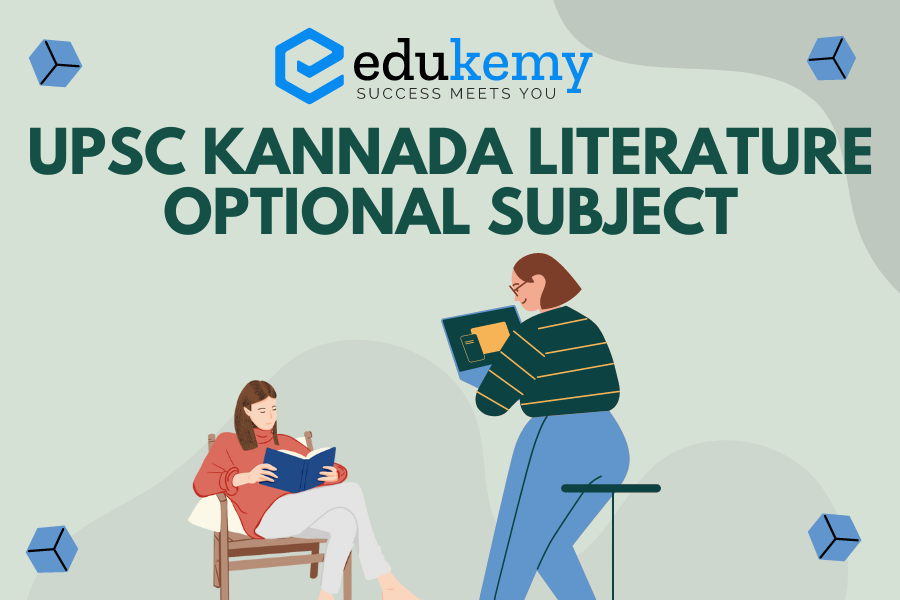
Delve into the rich tapestry of Karnataka’s cultural heritage by choosing Kannada Literature as your optional subject for the UPSC Civil Services exam. This subject offers a fascinating journey through the evolution of the Kannada language and its literary treasures. From the ancient epics of Pampa to the vibrant creations of modern Kannada writers, you’ll gain a deep understanding of Karnataka’s social, political, and philosophical landscape.
Contents
- 1 Kannada Paper 1
- 2 Kannada Paper 2
- 3 FAQs on Kannada Literature Optional Subject – UPSC
- 3.1 1. Is Kannada Literature a good optional subject choice?
- 3.2 2. Can I take Kannada Literature even if I’m not from Karnataka?
- 3.3 3. What are some resources for preparing for Kannada Literature?
- 3.4 4. How can I improve my Kannada writing for the exam?
- 3.5 5. Are there any benefits to choosing Kannada Literature?
- 4 In case you still have your doubts, contact us on 9811333901.
Kannada Paper 1
Section – A
A. History of Kannada Language
What is Language? General characteristics of Language. Dravidian Family of Languages and its specific features. Antiquity of Kannada Language. Different phases of its Development.
Dialects of Kannada Language: Regional and Social. Various aspects of developments of Kannada Language: phonological and Semantic changes. Language borrowing.
B. History of Kannada Literature
Ancient Kannada literature : Influence and Trends, Poets for study : Specified poets from Pampa to Ratnakara Varni are to be studied in the light of contents, form and expression : Pampa, Janna, Nagachandra.
Medieval Kannada literature : Influence and Trends.
Vachana Literature : Basavanna, Akka Mahadevi.
Medieval Poets : Harihara, Raghavanka, Kumara-Vyasa.
Dasa literature : Purandara and Kanaka.
Sangataya : Ratnakarvarni
C. Modern Kannada literature : Influence, trends and ideologies, Navodaya, Pragatishila, Navya, Dalita and Bandaya.
Section – B
A. Poetics and Literary Criticism
Definition and concepts of poetry; Word, Meaning, Alankara, Reeti, Rasa, Dhwani, Auchitya. Interpretations of Rasa Sutra. Modern Trends of literary criticism : Formalist, Historical, Marxist, Feminist, Post-colonial criticism.
B. Cultural History of Karnataka
Contribution of Dynasties to the culture of Karnataka: Chalukyas of Badami and Kalyani, Rashtrakutas, Hoysalas, Vijayanagara rulers, in literary context.
Major religions of Karnataka and their cultural contribution.
Arts of Karnataka ; Sculpture, Architecture, Painting, Music, Dance—in the literary context.
Unification of Karnataka and its impact of Kannada literature.
Kannada Paper 2
Section – A
A. Old Kannada Literature
- Vikramaarjuna Vijaya of Pampa (Cantos 12 & 13), (Mysore University Pub.)
- Vaddaraadhane (Sukumaraswamyia Kathe, Vidyutchorana Kathe)
B. Medieval Kannada Literature
- Vachana, Kammata, Ed. K. Marulasiddappa K.R. Nagaraj (Bangalore University Pub.)
- Janapriya Kanakasamputa, Ed. D. Javare Gowda (Kannada and Culture Directorate, Bangalore)
- Nambiyannana Ragale, Ed., T.N. Sreekantaiah (Ta. Vem. Smaraka Grantha Male, Mysore)
- Kumaravyasa Bharata : Karna Parva (Mysore University)
- Bharatesha Vaibhava Sangraha Ed Ta. Su. Shama Rao (Mysore University)
Section – B
A. Modern Kannada Literature
- Poetry : Hosagannada Kavite, Ed. G.H. Nayak (Kannada Saahitya Parishattu,
Bangalore) - Novel : Bettada Jeeva—Shivarama Karanta Madhavi—Anupama NiranjanaOdalaala-
Deva-nuru Mahadeva - Short Story : Kannada Sanna Kathegalu, Ed. G.H. Nayak (Sahitya Academy, New Delhi)
- Drama : Shudra Tapaswi—Kuvempu. Tughalak—Girish Karnad.
- Vichara Sahitya : Devaru—A.N. Moorty Rao (Pub: D.V.K.Moorty, Mysore.)
B. Folk Literature :
- Janapada Swaroopa—Dr. H.M. Nayak. (Ta. Vem. Smaraka Grantha Male, Mysore.)
- Janpada Geetaanjali—Ed. D. Javare Gowda.(Pub : Sahitya Academy, New Delhi).
- Kannada Janapada Kathegalu—Ed. J.S. Paramashiviaah (Mysore University).
- Beedi Makkalu Beledo. Ed. Kalegowda Nagavara (Pub : Bangalore University).
- Savirada Ogatugalu—Ed. S.G. Imrapura.
FAQs on Kannada Literature Optional Subject – UPSC
1. Is Kannada Literature a good optional subject choice?
Kannada Literature can be a scoring optional subject if you have a strong foundation in Kannada and a love for literature. It allows for in-depth exploration of a rich cultural heritage. However, like any optional, it requires dedicated study and practice.
2. Can I take Kannada Literature even if I’m not from Karnataka?
Absolutely! UPSC allows any optional subject selection regardless of your region. But, a basic understanding of Kannada will significantly enhance your comprehension of the literary works.
3. What are some resources for preparing for Kannada Literature?
- Books: Standard textbooks covering the UPSC syllabus for Kannada Literature are essential. Look for comprehensive resources with practice exercises and analyses of previous years’ question papers.
- Online Resources: Websites and online coaching materials can supplement your studies. Explore them for additional insights and practice questions.
4. How can I improve my Kannada writing for the exam?
- Read extensively: Immerse yourself in Kannada literature to grasp writing styles and vocabulary.
- Practice answer writing: Regularly write answers to UPSC-style questions on Kannada literature topics.
- Seek feedback: Get your writing reviewed by a Kannada expert or a mentor to identify areas for improvement.
5. Are there any benefits to choosing Kannada Literature?
Besides scoring well, Kannada Literature equips you with a deep understanding of Karnataka’s culture and history. It also refines your analytical and critical thinking skills, valuable assets for the UPSC exam and beyond.
In case you still have your doubts, contact us on 9811333901.
For UPSC Prelims Resources, Click here
For Daily Updates and Study Material:
Join our Telegram Channel – Edukemy for IAS
- 1. Learn through Videos – here
- 2. Be Exam Ready by Practicing Daily MCQs – here
- 3. Daily Newsletter – Get all your Current Affairs Covered – here
- 4. Mains Answer Writing Practice – here

